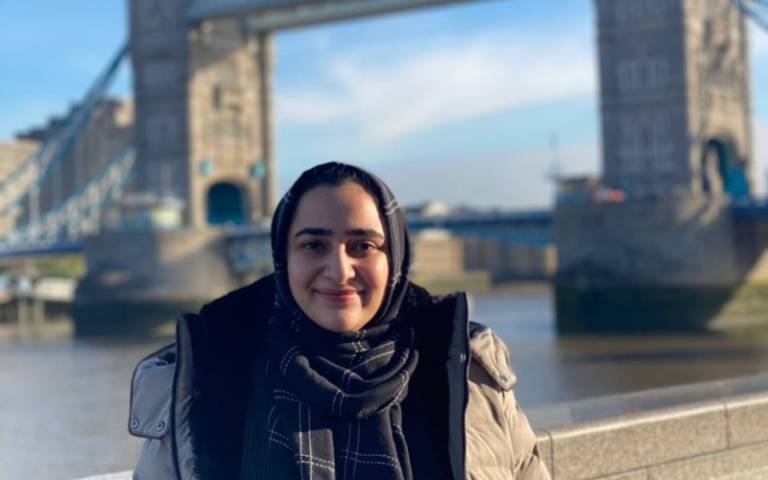Meet Ismat Juma, Global Prosperity graduate (2021-22). With an academic background in Social Sciences, now working with an International NGO supporting their Neglected Tropical Diseases programmes

- What is your background and why did you choose to study the MSc Global Prosperity at the Institute for Global Prosperity?
My academic background has always been focused on Social Sciences with a specific interest in Psychology. Before joining UCL and the IGP however, I had been working with a disability inclusion initiative in Pakistan, for almost 6 years focusing on economic empowerment, skills development and education for personal with disabilities. It was during my time at this organization that I delved further into the internal workings of the development sector specifically in the context of a global south country like Pakistan. It was my interest in enhancing my skills and exploring past the traditional development theories and practices that I chose to join the MSc Global Prosperity program at the Institute for Global Prosperity.
- What did you enjoy the most about studying with the IGP?
Though there were many elements about studying at the IGP that I enjoyed, the two major elements I reflect back on are: the diversity within the community in terms of Culture, knowledge and experience, and the mixture of theory and practice in the curriculum.
Through the year I got to learn immensely from the experiences of not only the professors and external experts, but also from my fellow students. We were always encouraged to connect our own experiences and other domains to what we study in our classes, seminars. Though a research focused program, the IGP included projects that allowed us to connect theory with practice and, especially in my case allowed me to continue this hybridity in my dissertation.
- Which topics, extracurriculars, or electives did you find most interesting and why?
There have been many elements in this program that have sparked my interest however, one of my chosen electives, urban futures and prosperity, led by Dr. Hanna Bauman truly got me interested in a topic that I never saw myself studying. In fact, it impacted me to the extent of re-thinking my dissertation path and topic.
Additionally, the IGP and the Bartlett provided me with extracurricular opportunities and additional projects that enhanced my knowledge and experience through practice. The first being a Student Partner Project, led by Ms. Mara Torres looking at research as a Community practice and rethinking transformative education. Secondly, through the IGP and the Bartlett, I was able to become part of the Bartlett's Community of Engagers Steering Group which works to support the network of Bartlett staff (academic and professional services) and students, and creates opportunities for the Community to collaborate, learn, build capacity and skills, share and celebrate best practice, and promotes a culture of engaged research and teaching across the faculty.
- What does prosperity mean to you?
As we have learned at the IGP, prosperity is a very subjective concept, however, to me it could mean individuals and communities being empowered to create a society that promotes quality wellbeing.
- Can you tell us about your experience outside study, such as living in London or travelling in the UK, and how it has shaped or inspired you?
London has always been my favourite city, and being able to move here and explore the city and the UK in the post-covid era was a dream. It gave me a new sense of appreciation for travelling and exploring new places and taking part in activities that I never thought I would be able to.
Throughout the year, together with my friends or family or even alone I would explore different locations or go on hikes whenever I got the chance. I also travelled to nearby places such as Brighton, Oxford, Cambridge, Liverpool, Bath and Manchester. However, my favorites till now has to be the Seven Sisters Cliffs
- What have you been doing since graduating and how did your MSc help you progress in your career?
Since graduating, I have been working with an International NGO supporting their Neglected Tropical Diseases programmes, looking at initiatives focusing on public health and disabilities. In this role, I also get to take my learnings from the IGP and re-think traditional development practices.
Furthermore, I continue to be a part of the Bartlett's Community of Engagers Steering Group, supporting the network’s activities.
- What advice would you give to new IGP students and to those thinking of applying?
My advice to incoming students at the IGP would be to keep an open mind, have as many conversations with members of the community (professors, students, TAs, administration) as you can, and take part in projects and activities beside the curriculum.
The programs at the IGP are designed to teach you to look at different perspectives and work towards long-lasting impact, so take advantage of what the community has to offer for your own holistic growth and to achieve your goals.
- What was the topic of your dissertation and could you share your journey around it?
The title of my dissertation was, “Spaces That Empower Women Learners - The Relationship Between Built Environment, Learning and Empowerment of Vulnerable Women in Development Settings”.
This research aimed to look at the relationship between Built Environment(BE), Empowerment and Learning for vulnerable women. The report explored how vulnerable women participating in social learning projects experience the BE they are provided, which may vary in quality due to challenges faced by social organizations. The research will investigated what ‘empowering’ learning spaces look like and how they impact empowerment of vulnerable women. Furthermore, The study also looked at factors that social organizations consider while planning spaces, what they consider as an empowering space and the challenges they face.
For this research, I worked with WONDER Foundation, through UCL’s Community Research Initiative (CRIS). The findings of the research will support WONDER Foundation’s future projects supporting vulnerable women.
 Close
Close

